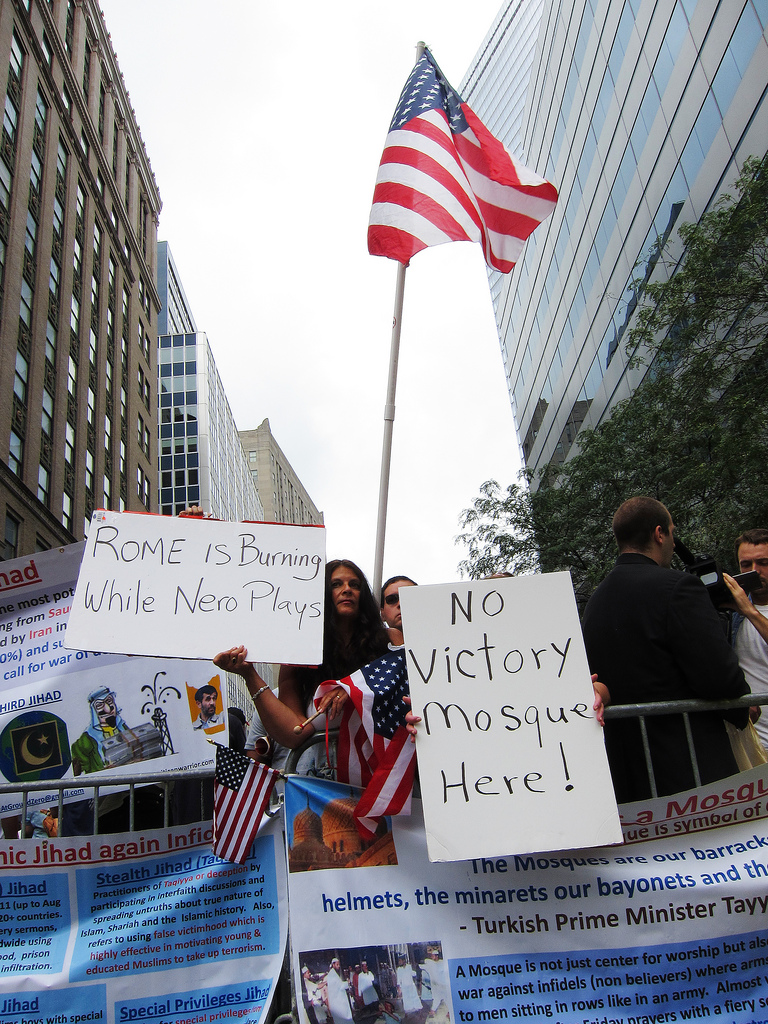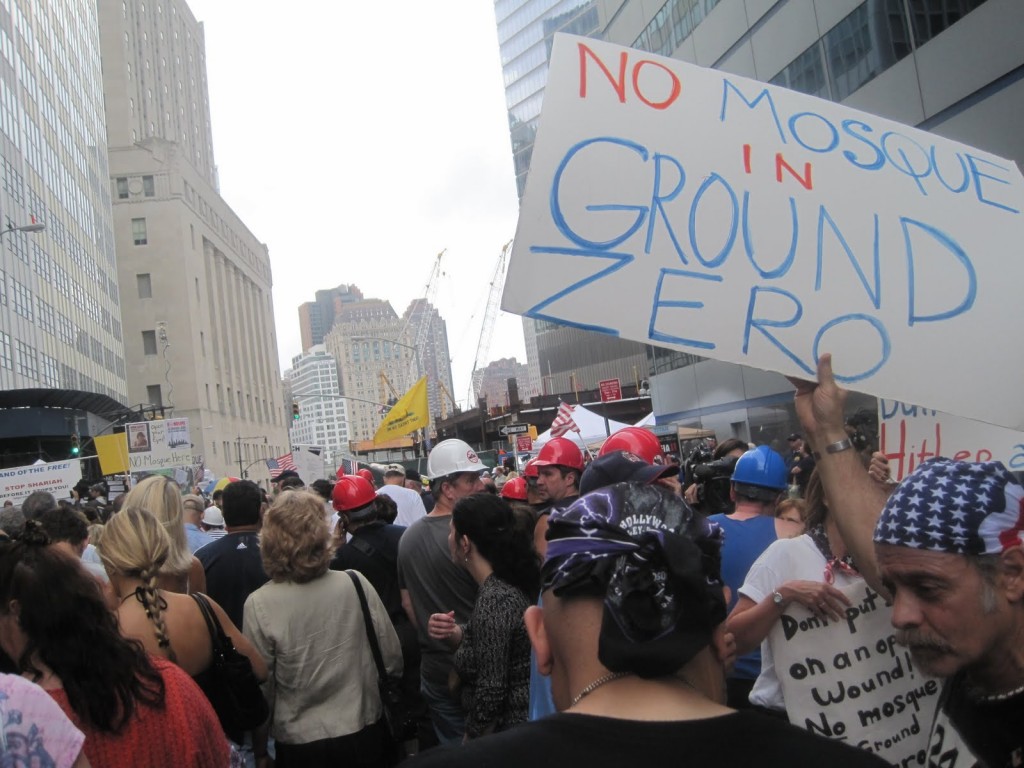When Republicans and Ayatollahs agree: On the politics of Qur’an burnings and “The Ground Zero Mosque”
Devil's Advocate, Politics - Posted on Thursday, September 16, 2010 15:10 - 3 Comments
Two news stories from the US have come to serve as an illustration of the general hostility that Muslims face in that country. The first is about a proposed community centre in Manhattan located two blocks away from the former site of the World Trade Centre; the second concerns a Florida pastor who planned to commemorate the anniversary of the September 11th attacks with a day of Qur’an incineration.
In this article, I argue that although there may be some underlying suspicion of Islam in a country living with the memory of the devastating terrorist attacks, these sentiments are amplified by political operators who exploit the public’s perception for electoral gain. The political posturing is not limited to those within the US but can be observed abroad as well. In places as far removed from the events as Afghanistan and Kashmir, activists with local interests steer the public‘s sentiment in their desired direction.
The first mention of the now familiar project to build a community center with a Muslim prayer space at 45 Park Place, Manhattan, was in a New York Times front-page article published on the 8th of December 2009. It is a positive piece that spoke about the expected regenerative effects of the project and hailed its organizer, Imam Feisal Abdul Rauf, as a bridge-builder. The article emphasized the support the project received from the local community, Jewish and Christian leaders, and the Mayor’s office.
Days later, the Imam’s wife, Daisy Khan, was interviewed about the proposed centre in a five minute segment on Fox News’ The O’reilly Factor show, by conservative host Laura Ingraham. The segment, entitled ‘Ground Zero Mosque’, was cordial, even supportive. ‘I can’t find many people who really have a problem with it…’ Ingraham said as she introduced Khan. After quizzing Khan about the project and some statements uttered by Imam Feisal, Ingraham concludes with ‘I like what you’re trying to do and, Ms Khan, we appreciate it…’
A quiet five months elapse before blogger Pamela Geller, who can only be described as a serial conspiracy theorist, began to post alarmist entries about the planned community centre, the first of which appeared on the 6th of May 2010. Days later, The New York Post published a critical piece on the project, while Geller escalated her offensive both on her blog, as well as on conservative talk shows on radio and television. Buoyed by the media attention, she continued to lead the opposition to the project, and organized a major protest movement.
Rick Lazio, Republican candidate for governor of New York, spotting an opportunity to bolster his standings in the polls in anticipation of primaries in September, quickly allied himself with those opposing the project, and even called on New York’s Attorney General to investigate the organizers of Park 51(he eventually lost the Republican primary to newcomer Carl Paladino.
Lazio’s positioning is understandable; an ABC News/Washington Post poll published last year found that 48% of Americans have ‘an unfavourable view of Islam’. This large pool of potential voters, coupled with his uninspiring story (he had been previously employed as a banker and lobbyist) made vocal opposition to the ‘Ground Zero mosque’ a sound electoral strategy.
It was at that moment, with Fox News acting as a mouthpiece for the Republican Party, that the formerly supportive line taken by Ingraham turned into vociferous opposition.
By then, other news outlets were regularly reporting on a story that many viewed as a welcome commotion in an otherwise uneventful summer. That first segment on Fox News had already set the terms; the project started to be commonly referred to as ‘the Ground Zero mosque’. Despite efforts by some commentators to explain that the project is neither a mosque, nor sufficiently near Ground Zero to earn such a title, the momentum was unstoppable.
Encouraged by a Quinnipiac poll which found that voters opposed the project despite acknowledging the developers’ right to build, republican leaders, such as former New York Mayor Rudi Giuliani and former Vice-Presidential candidate Sarah Palin, added their voices to the growing cacophony of opposition. The reasons adopted by these more moderate (in comparison to Geller) figures also evolved. First, it was the intentions and character of the Imam behind the centre; then, it became the funding of the centre, until finally resting on the ‘insensitivity’ of erecting such a structure so close to the former World Trade Centre site so soon after the attacks.
In this heated environment, a Florida pastor, Terry Jones, springs to the public’s attention by announcing ‘International Burn a Koran Day’ on the upcoming ninth anniversary of the attacks of September 11th. Although I don’t doubt the pastor’s aversion to Islam, the inclusion of the word ‘International’ betrays a yearning for attention and significance that was probably satisfied by the inordinate airtime dedicated to his small church.
Up until then, the Obama administration was cautious about wading into the debate over the Manhattan community centre. Condemnation of the pastor’s plans however was swift and forceful. Officials in the highest echelons of the administration reacted with strongly worded statements. General David Petraeus warned about the dangers that such a commemoration would pose for US servicemen. President Obama characterized the pastor’s plans as un-American: ‘the idea that we would burn the sacred text of someone else’s religion is contrary to what this country stands on. It’s contrary to what […] this nation was founded on. And my hope is that this individual prays on it and refrains from doing it’ he said in an interview with ABC’s George Stephanopoulos, two days before the anniversary of the attacks.
 Condemnation of Jones’ plans was unanimous. Not only did other senior members of the administration decide to publicly voice their indignation, but even republicans such as Sarah Palin, who had thus far opposed the administration on virtually every issue, condemned the scheduled bonfire. To her credit, Palin managed to both criticize the pastor’s plans as well as advance an argument against the community centre in the same breath: ‘people have a constitutional right to burn a Koran if they want to, but doing so is insensitive and an unnecessary provocation — much like building a mosque at Ground Zero’ she wrote in a Facebook message.
Condemnation of Jones’ plans was unanimous. Not only did other senior members of the administration decide to publicly voice their indignation, but even republicans such as Sarah Palin, who had thus far opposed the administration on virtually every issue, condemned the scheduled bonfire. To her credit, Palin managed to both criticize the pastor’s plans as well as advance an argument against the community centre in the same breath: ‘people have a constitutional right to burn a Koran if they want to, but doing so is insensitive and an unnecessary provocation — much like building a mosque at Ground Zero’ she wrote in a Facebook message.
In response to the mounting pressure, the pastor, who by then was clearly looking for the least damaging way out, announced that the burning had been cancelled, but only after receiving reassurances that the community centre would be relocated from Park Place. The claim was swiftly denied by the organizers of Park 51.
On the anniversary of the attacks, there were a handful of isolated incidences of Qur’an burnings across the US that failed to attract much media attention. Abroad, violent protests over both the planned and reported Qur’an burnings were in full swing in Afghanistan, and Indian-administered Kashmir. Demonstrations in the latter morphed into anti-Indian rallies that clashed with police. In Afghanistan, a day before the commemoration of the World Trade Centre attacks, demonstrators attacked a NATO compound resulting in three deaths. Indonesia and Pakistan saw similar protests; there were no casualties.
Although it’s safe to say that Muslims resented both the proposed as well as the executed burnings, there is no reason to believe that Afghans or Kashmiris are more concerned about the wellbeing of the Qur’an than other Muslims. More likely to have had an effect is the political strife their populations are currently experiencing. Reports of the burnings were likely used by activists to encourage demonstrations that were then directed towards NATO headquarters (in the case of Afghanistan), and towards Indian government offices (in the case of Kashmir). The burnings, in effect, were nothing but a pretext to foment public outrage that was then redirected elsewhere.
Iran’s official response to the Qur’an burnings is almost symmetrical to the political posturing performed by Republican politicians. Ayatollah Khamenei not only denounced the act but also the US government for failing to arrest the pastor: ‘to prove its claim of not being involved […] the American government should appropriately punish the main figures behind this great crime’, he said. This is despite the unanimous rebuke that the pastor received.
Other Iranian government officials and religious leaders joined the fray by adding their own twists to the story. Foreign Minister Manouchehr Mottaki even alleged that “Zionist elements” were behind the burnings. At times, it seems that whatever the stimulus, the condemnation issued by the Iranian government is uniform.
Although, at first sight, the stories of the proposed Manhattan community centre and the planned Qur’an burning may be seen as ones about religious freedom versus freedom of speech, on closer inspection, they appear to be mere pawns used by political operators across the spectrum and across the globe. As others might say: nothing new there.
Omer Ali is an economist based at the University of Warwick and writes on economics, politics and world affairs. He is a former editor of the Voice Magazine. His “Devil’s Advocate” column appears every other Thursday.
3 Comments
Tony Stark
Ed
I love your phrase “Although I don’t doubt the pastor’s aversion to Islam”. Classic Omer.
Omer
Tony: The line you refer to is lifted from a CBS News article (http://www.cbsnews.com/8301-503543_162-20016041-503543.html) about demonstrations in Afghanistan. It may be inaccurate, I’m not sure. Generally though, the point was to show how albeit being billed as events against the burning of Qur’ans, protests ended up being about other issues. It was not my intention to demonize the protesters.
Ed: Cheers



“demonstrators attacked a NATO compound resulting in three deaths:” Nice way of suggesting that the NATO supported Afghan army’s murder of three protesters (who did not attack the compound, rather they stage a protest outside it) was the protester’s own fault